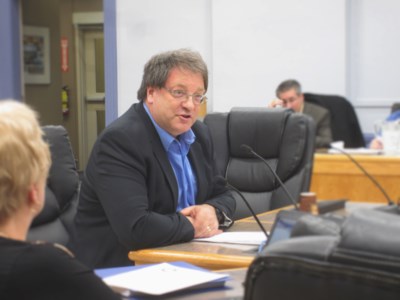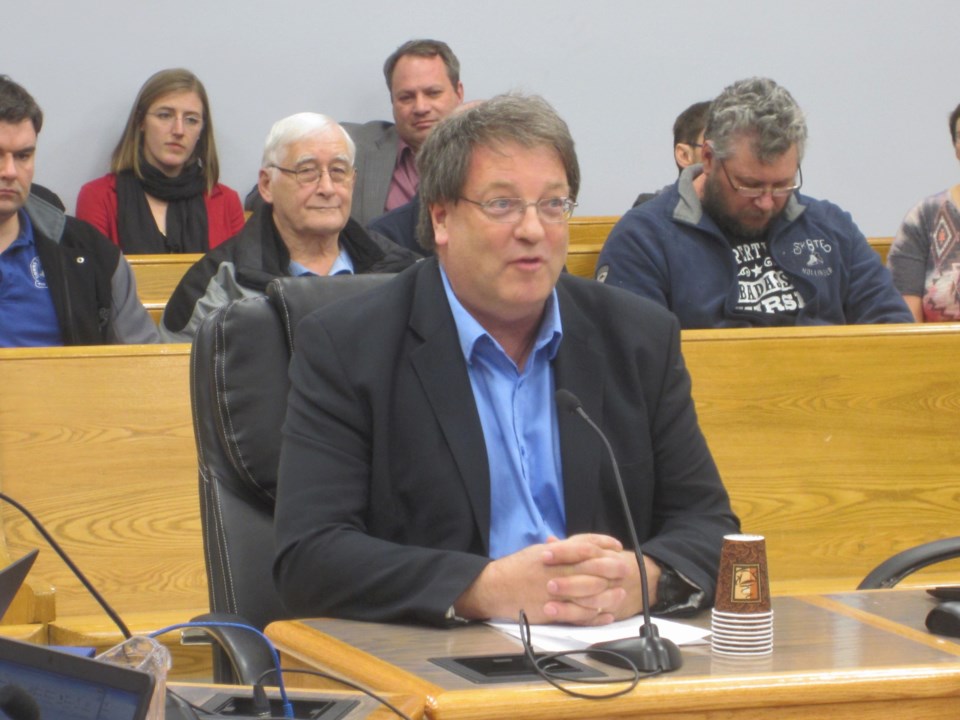Dr. Ken Coates, Canada Research Chair in Regional Innovation, has begun the process of determining the legitimacy of Timmins as a bigger player in the field of post-secondary education.
"I have been asked by the Northern Policy Institute to undertake a fairly quick two-month study, of the feasibility of an English language university here in Timmins," he told city council this week.
Dr. Coates, who is based in Saskatoon, Sask., said he was in the early stages of his study, and that he was in town gathering information, and hopefully some input from council. He didn't receive any comments from members of council during his appearance.
He told council that he was raised primarily in the Yukon Territory, and how that related to post-secondary studies.
"In 1974, when I went to university, only 10 of my high school class went to university. There were 110 graduates," he said, noting that those numbers were 'pretty common' in that time.
"Of the ten of us who went to university, two of us lasted eight months. And the ones who didn't succeed eventually came home, and never quite recovered.They were always very hard on themselves. They considered themselves to have been failed either by the system, or themselves. My approach to the university system since that time has been very much shaped by the need to make sure that our post-secondary opportunities align with what the students are capable of doing, what the communities need and want, and where the economy is going," he said.
Coates called his career 'very unusual', saying he has taught at universities, as well as working in administration departments.
"I was the founding Vice President of the University of Northern British Columbia (established in 1990), I've worked in Hamilton, New Zealand. Been in Japan. I've visited probably as many as 300 universities around the world. Most of them in rural, and small towns, and remote regions. I'm not much interested in big cities," he said.
His research has been focused largely on 'Northern issues' and the challenges faced by remote communities. He clarified the term 'remote' as including municipalities smaller than 60,000 people.
"I'm particularly concerned about the sustainability of smaller communities in the age of digitization. We are in the middle of the fastest period of scientific and technological revolution, and evolution in human history," said Coates.
He said that society has only taken 'half a step' out of the starting blocks in a 100 metre dash, relating to technological advancements coming in the near future. He also had a somewhat ominous bit of information to chew on.
"If you think its gone fast because your kids communicate with smart phones and have got all sorts of new technology coming down the line, we are just getting going. Artificial intelligence by itself will have huge implications for everything that we do, and everything that we operate in our society," said Coates.
He said was challenged by the Northern Policy Institute to an 'evidence based study' on the city, and emphasized he wasn't there to report what the mayor, councillors, or city staff wanted, he would be report on 'what makes sense' economically, politically, and educationally.
"My job is not to advocate for any one position, but to find out what works, and what would not work in this particular environment," said Coates.
 Dr. Ken Coates will be gathering information from many angles for his feasibility study on an English university in the city. Andrew Autio for TimminsToday
Dr. Ken Coates will be gathering information from many angles for his feasibility study on an English university in the city. Andrew Autio for TimminsToday There are several options available for a community such as Timmins, including satellite campuses and what he calls 'boutique universities', which are focused on regionally relevant programs.
He feels that people need to think of a university as more than just a series of buildings, and change attitudes about post-secondary education in general.
"There's some really serious problems and misapprehensions. In fact, something like 40 percent of the students who go to community colleges in Ontario, actually already have a degree. They get a degree and then they go back to a community college for advance training in more specialized, market oriented way."
While university degrees may seem like a higher achievement, many programs realistically have little practical use in today's economy.
"The major challenge we have with post-secondary education is really around people's expectations. If you ask parents, they overwhelmingly want their children to go to university. Even if their children would be better served going to college," he said.
He will be examining the 'if you build it, will they come?' or 'Field of Dreams' model for Timmins. He said that in most 'smaller' communities, sustainability can be an issue, and that support from all angles is often required.
"You really need full on mobilization of the community to make something like this fly, and the timing has to be right."
Timmins is currently home to Northern College, a highly respected college of applied arts and technology. As well as College Boreal, and Universite de Hearst, which offer programs in French.
Dr. Coates said he will be working on the report for the rest of January, which he will then submit to the Northern Policy Institute.
"I look forward to producing that report, and hopefully having further conversations with the good people of Timmins and Northeastern Ontario, as you consider your educational options going forward."



